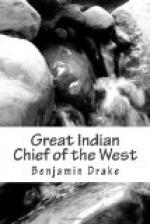In pursuance of this new arrangement, on the 22d of June, the party left New York, in a steam boat for Albany, where they arrived on the following day. At this city, they were met by a crowd of spectators, drawn together by their anxiety to see Black Hawk, so numerous, that it was found necessary to disguise the Indians, in order to enable them to reach their lodgings. They remained in Albany until the morning of the 25th, when they departed for Buffalo, which place they reached on the twenty-eighth. During their stay in Buffalo which lasted for three days, they had an interesting interview with some of the Seneca Indians, who are residing on their reservation near that place. They were addressed by Karlundawana, a worthy Seneca chief, who after expressing the pleasure of his people to meet the Sacs and Foxes, and referring to the condition of the Indians generally, respectfully counselled Black Hawk and his party, to return home in a peaceable mind; to take up the tomahawk no more against the white people; but to cultivate the earth, and be happy. Black Hawk replied, “Our aged brother of the Senecas, who has spoken to us, has spoken the words of a good and a wise man. We are strangers to each other, though we have the same color, and the same Great Spirit made us all, and gave us this country together. Brothers we have seen how great a people the whites are. They are very rich and very strong. It is folly for us to fight with them. We shall go home with much knowledge. For myself I shall advise my people to be quiet, and live like good men. The advice which you gave us, brother, is very good, and we tell you now we mean to walk the straight path in future, and to content ourselves with what we have, and with cultivating our lands.”
From Buffalo the captives were taken by water to Detroit, where their reception is said to have been much less enthusiastic than in the other cities through which they had passed. It was stated in the newspapers of the day, that they were burnt in effigy in that place. Black Hawk, in visiting the the former residence of Governor Cass, remarked, “This is the old council ground. I have had much good counsel here; but my trail led to the opposite shore, and my ears were closed.” Their visit to Detroit being over, they proceeded to Green Bay, and thence descended the Wisconsin to the Mississippi and down that river to Fort Armstrong, on Rock Island, which place they reached about the first of August. In passing by the site of the old Sac village, Black Hawk was deeply affected, and expressed much regret for the causes which compelled him to emigrate beyond the Mississippi. The return of the Prophet was also attended with melancholy associations. His village over which he had long presided, was entirely broken up—his wigwam in ashes—his family dispersed, and, he, a suppliant for a home in the village of some other chief.




